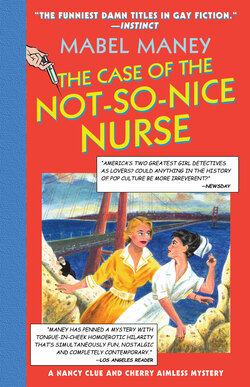Читать книгу The Case Of The Not-So-Nice Nurse - Mabel Maney - Страница 2
About the Author
Оглавление“I was born in the thriving metropolis of Oshkosh, Wisconsin,” writes Mabel Maney. “‘I’ll never forget that night,’” she recalls her mother telling her. “‘We had that big lightning storm that knocked out all of Oshkosh and most of nearby Menasha. I always thought Mabel had something to do with it,’” Mabel’s mother chuckled.
After her parents were lost at sea, Mabel took up residence with her Great Aunts Maude and Mavis Maney, who had as young women earned their living as bareback riders in a traveling circus before settling in the farm town of Appleton to write their memoirs, Circus Queens.
Mabel’s life was idyllic until the arrest and conviction of Great Aunt Maude for the murder of her late husband, whose body surfaced from under Maude’s wisteria bush during the summer of the Great Wisconsin Rains.
Mabel spent the next three years dividing her time between Appleton and the State Penitentiary for Women in LaFayette, After her Great Aunt Maude’s release, the trio moved to Bear Lake, where Mabel attended Catholic Girls School, graduating with highest honors in Conversational Skills and Table Manners.
Mabel Maney’s installation art and hand-made books, self-published under the World O’Girls Books imprint, have earned her fellowships from the San Francisco Foundation and San Francisco State University, where she received her MFA in 1991. Her art has been exhibited in numerous galleries throughout the United States. Artspace wrote of the hand-made World O’Girls edition of this book: “In Maney’s refigured narrative, The Case of the Not-So-Nice Nurse, gay heroine Cherry Ames moves unhampered through a world populated by lesbian nuns and adventuresses, even engaging in a one-nighter with Nancy Drew. Entertainment aside, by appropriating and redefining the sexual orientation and cultural limits placed upon her fictional female characters, Maney provides a powerful reminder of the exclusionary nature of the ruling (in this case, straight) culture, with its power to define specific roles and acts as ‘natural’ while denying or marginalizing others.”
